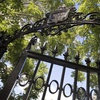{shortcode-8cf6700e841e27e59b724eed520130825595ccd3}
Harvard Chabad is petitioning the city of Cambridge to change its zoning laws to exempt religious buildings from certain restrictions in an apparent effort to move forward with plans to expand its headquarters, currently blocked by the Board of Zoning Appeals.
The petition is Chabad’s latest move in their ongoing legal effort to move their expansions forward, following a September lawsuit against the BZA. In the suit, Chabad alleged that the BZA had engaged in religious discrimination by denying the group’s request for a zoning variance.
The variance would have allowed Chabad to move forward with their plans — initially blocked by the BZA in May 2024 — to consolidate two of their three historic Banks Street buildings into one. The congregation claims the expanded property would provide needed indoor space to host religious services and events for its growing congregation.
Chabad is currently engaged in mediation with the BZA to resolve the lawsuit. If unsuccessful, the suit may proceed to trial.
Chabad’s petition — filed on March 10 — requested that the city amend its zoning ordinances to exempt buildings for religious use from current limitations on floor-to-area ratios and gross floor area limitations and certain open space requirements.
Under the proposed amendments, construction of six-story buildings on select lots would also be permitted for religious use.
Similar exemptions were provided to residential housing after the Council voted to eliminate single family zoning across the city last month, after more than a year of contentious debate between residents, city leadership, and housing experts.
The new zoning guidelines would permit four-story buildings to be constructed by-right on all residential properties in Cambridge, and six-story buildings for inclusionary housing projects under certain limitations.
City Councilor Patty M. Nolan ’80 wrote in an email that Chabad’s petition may be unnecessary under the current exemptions already provided to residential housing.
“A question was raised on whether religious use is automatically allowed to follow the residential zoning limits. If that is true, due to non-discriminatory language in other laws, then the petition may not be needed,” she wrote.
The petition was brought before the Council on March 17, where it was referred to the Planning Board and Ordinance Committee. The committee has yet to reach a decision on the petition.
Harvard Chabad President Rabbi Hirschy Zarchi did not comment on the petition, citing the confidential nature of Chabad’s ongoing mediation with the city in federal court.
— Staff Writer Sebastian B. Connolly can be reached at sebastian.connolly@thecrimson.com and on X @SebastianC4784.
— Staff Writer Julia A. Karabolli can be reached at julia.karabolli@thecrimson.com.
Read more in News
Six Candidate Pairs Contend for HUA Presidency












